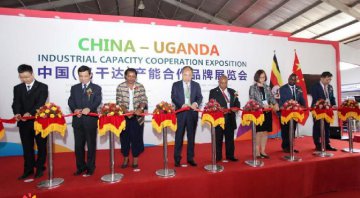Coffee is one of Uganda's major foreign exchange earners and about 500,000 households in the east African country depend on coffee production, according to Uganda Coffee Development Authority (UCDA), the country's regulator of the coffee industry.
Last year the sector fetched 492 million U.S. dollars compared to the previous year's 490 million dollars.
At the invitation of the Ugandan government, the YCE now wants to scale up the amount of foreign exchange the country earns from the sector to increase farmers income and also develop the sector.
YCE is a state-owned enterprise in Yunnan Province with a mission of pushing for the development of China's coffee industry.
It provides services for auction, electronic trading, storage, warehousing and logistics of coffee.
Uganda is hoping to take advantage of the YCE experience to fast track the development of the sector in the country.
While meeting Ugandan Prime Minister Ruhakana Rugunda on Friday, the YCE delegation led by Cao Ronggen signed a cooperation agreement with UCDA.
Cao said there are issues that need to be worked on if Uganda is to reap from China's huge market.
He said that although Uganda exports large volumes of coffee, most of it is in raw form, which limits the amount of money earned from the sector.
He noted that Uganda now needs to focus on exporting finished coffee product that meets international standards.
He also noted that although Uganda's coffee, both Robusta and Arabica, have unique characteristics like a strong aroma, most of it is not branded. He said there is need to accelerate the profiling of the coffee for brand recognition and promotion in the international market.
"Coffee growing in Uganda is very unique from the environment point of view. It is rare to find a similar producing region like Uganda in the rest of the world," Cao said, noting that the Arabica coffee grown at altitudes of between 1,800 meters-2,000 meters and the Robusta at between 1,400 meters-1,600 meters give Ugandan coffee unique characteristics.
Prime Minister Rugunda said Uganda hopes to take advantage of YCE's experience to work on the challenges the country faces in the sector.
"We agree with the plans that you have talked about branding our coffee, streamlining trade, focusing on quality and having a strong presence on the Chinese market. This is something that we have wanted to do for many years, I am glad it is becoming a reality," Rugunda said.
"We want to take advantage of your strong areas in order to improve our own weak areas," he added.
Cao said once Uganda's coffee meets the required standards and produced in the right quantities, it will be traded on China's Coffee Stock Exchange that is to be launched next year.
"If everything goes well, the Chinese government will launch our Coffee Stock Exchange next year. If the quality and quantity improves, Ugandan coffee will be part of our stock exchange market," he said.
The two parties agreed that cooperation will not only focus on trading but overall development of Uganda's coffee industry.
YCE will collaborate with UCDA in harmonizing coffee grading specifications and promoting Uganda coffees in China.
"This will inter alia include developing system to support trading to compete in the China market, increasing awareness of Uganda coffee by Chinese consumers and buyers," the agreement said.
YCE and UCDA also agreed to take advantage of the financing package under the Forum on China-Africa Cooperation framework and preferential market access into the China market to increase coffee exports and promote the development of Uganda's coffee industry.
YCE will also assist Uganda coffee in accessing the wider Asia market through their distribution channels and networks.
Ezra Suruma, head of Prime Minister's Delivery Unit, told Xinhua in an interview after the signing of the memorandum that the cooperation with YCE comes at an opportune time when the country is implementing a coffee road-map that aims at increasing coffee exports from 3.5 million 60-kg bags in 2016/17 to 20 million 60-kg bags 2025.
"Our strategy of 20 million bags is premised on the existence of a market. We have planted coffee and we must make sure that we have a market. The Chinese market is the fastest growing market in the world," Suruma said.




















Latest comments